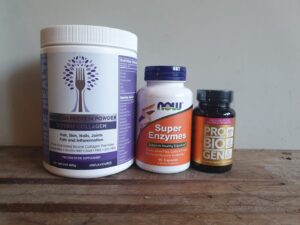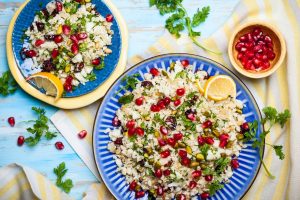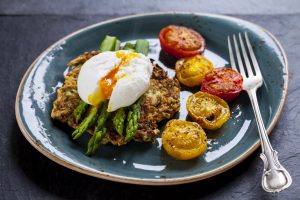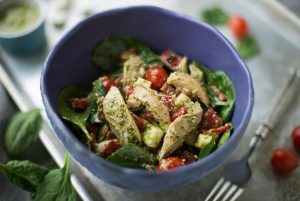In my course Fit28, I teach 5 nutrition principles. Following these principles means you’ll feel so much better in just 28 days – from increased energy levels to better sleep, a more positive mood and improved fitness performance.
The 5 principles are:
Eat Real Food
Make natural, whole and minimally processed foods the basis of your diet. Avoid nutrient-poor, processed and ultra-processed foods – these foods have harmful and detrimental effects on the body. Prepare most of your meals from scratch.
Eat the Rainbow
Eat a wide variety of fruits, vegetables and fresh herbs every day. They contain the micronutrients your body needs to function optimally and the fibre crucial for a healthy gut.
3 Meals per Day
Include high-quality protein, healthy fats and lots of vegetables at each meal. No plate without veg! Limit snacking.
Bye Bye Biscuits
Lower your intake of refined and processed carbohydrates. Eat low sugar fruits and dark chocolate. Save dessert for weekends. Find the carb level that works for you.
Food Quality Matters
Choose low-allergen, anti-inflammatory, nutrient-dense whole foods. Choose local, wild, organic and seasonal foods and support British food producers. Include healing foods such as bone broth or collagen.
There are two ways that I teach my clients (depending on their own preference) to approach making changes to their nutrition:
1. Try a complete 28 day reset (the harder option but one that brings quicker results)
2. Work on making small, positive changes to your eating habits (easier to implement but won’t bring as dramatic results.)
What Should I Eat?
Eat Real Food
1. Meat
2. Fish and seafood
3. Eggs
4. Vegetables, fruit, herbs and spices
5. Natural fats, nuts and seeds
6. Pulses
What Should I Avoid?
If you choose the full 28 Day Reset option, avoid these foods completely for 28 days (otherwise limit these foods).
1. All forms of sugar and artificial sweeteners
2. Alcohol
3. Grains
4. Dairy
Why?
These food groups do one or more of the following:
- Promote an unhealthy psychological response.
- Lead to blood sugar imbalances.
- Do not support a healthy gut.
- Cause inflammation in some people.
- Lack essential nutrients or even deplete nutrients.
Nutrition Principle 1: Eat Real Food
If this is the ONE thing you take away from this post, I will be happy!
In my nutritional therapy course, I learnt 100 dietary theories! But I quickly realised that what most successful diets have in common is that they get you to base your diet on whole and minimally processed foods.
For the majority of human history we ate some combination of whole plant and animal foods, and it has only been in the last 150 years that we have begun to rely so much on processed and more recently ultra-processed foods.
With the rise in consumption of nutrient-poor, ultra-processed foods, we now find ourselves in the midst of the worst chronic disease epidemic humans have ever faced.
By sticking to this one nutrition principle, you can enjoy your food without worrying about the balance of macronutrients or the number of calories. Real food is full of micronutrients, hard to overeat, and is satisfying and delicious!
Nutrition Principle 2: Eat the Rainbow
This is another of my key nutrition principles. Hundreds of studies have shown that eating a wide variety of produce correlates with a reduced risk of disease.
Eat a wide variety of fruits, vegetables and fresh herbs every day. They contain the micronutrients your body needs to function optimally and the fibre crucial for a healthy gut.
The British Association of Nutritional Therapists support the Eat the Rainbow message, recommending ‘7 a Day’ made up of 5 veg and 2 fruit, or 6 veg and 1 fruit for those trying to lose weight.
3 Meals a Day
Include high-quality protein, healthy fats and lots of vegetables at each meal. No plate without veg! Limit snacking.
The main reason for our principle of eating 3 meals a day is that this will help to avoid the dreaded blood sugar roller coaster.
Here’s what happens: you skip breakfast and by mid-morning your blood sugar is getting very low. You feel jittery and light-headed, and you crave sugar. You have a big milky coffee with an almond croissant. The large amount of sugar hitting your bloodstream gives you a short-lived burst of energy.
In response to all this sugar your body releases insulin to bring your blood sugar back down as quickly as possible, so an hour or so later you get a blood sugar crash. This leaves you low in energy and craving more sugar, carbs and / or caffeine to pick you back up.
Maybe you eat some pasta or a wrap or sandwich for lunch followed by crisps or chocolate. Guess what? Your blood sugar spikes and then crashes again, and so the cycle continues leaving you feeling strung out and exhausted by the end of the day.
If you eat 3 substantial meals which include high-quality protein, healthy fats and lots of vegetables at each meal then you should have steady blood sugar and stable energy levels throughout the day.
Overtime you will notice that you are less inclined to snack (and might notice that the urge to snack is often driven by boredom or other emotions rather than hunger) and you just feel better in yourself.
Eating 3 meals a day will make a huge difference to your overall health because stabilising your blood sugar and having good insulin sensitivity reduces your chances of suffering from many modern day lifestyle diseases such as diabetes and heart disease.
Nutrition Principle 4: Bye Bye Biscuits
To avoid the dreaded blood sugar roller coaster, my next nutrition principle is “Bye Bye Biscuits”.
The aim is to lower your intake of refined and processed carbohydrates. A key point here – I am NOT telling you to avoid carbs. I’m talking processed carbs.
That’s because processed foods such as pastries, biscuits, cakes, doughnuts and crisps have been manufactured to have the perfect balance of carbs + fat to promote overconsumption.
Did you know that there are very few natural foods that contain high levels of both carbs + fat? Plant foods tend to be high in carbs and fibre, but low in fat. Animal foods are high in fat and protein, but low in carbs. That’s why we don’t tend to overeat these REAL FOODS.
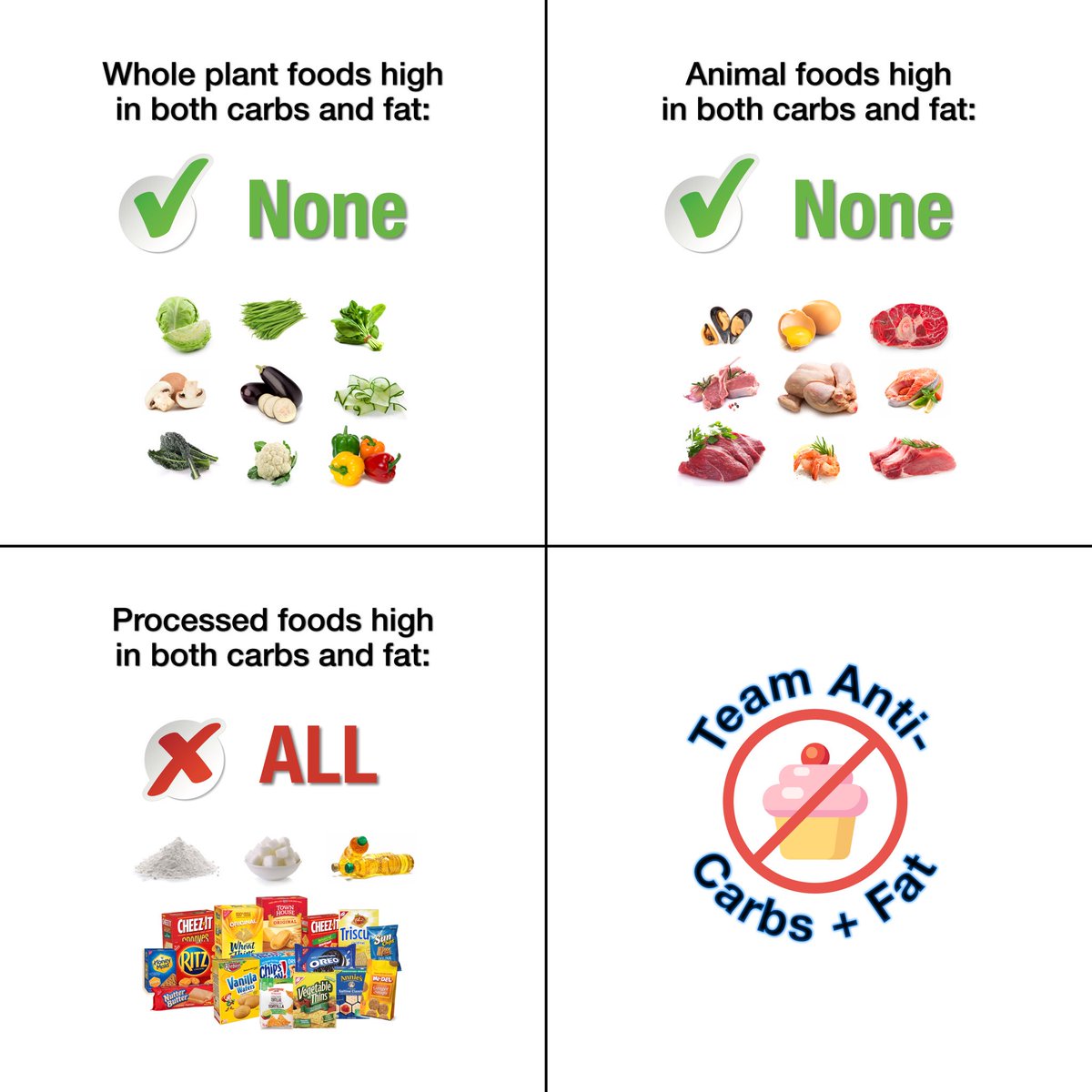
When you fancy something sweet, eat low sugar fruits or 85%-90% dark chocolate.
That’s not to say you can’t ever enjoy your favourite sweet things, but try to save dessert for weekends.
Find the carb level that works for you by experimenting to see if you feel better eating MORE carbs from real food sources (bananas, berries, potatoes, sweet potatoes, squash, parsnips etc.) or LESS carbs.
Play around with carbs vs no carbs at meals and see what your energy levels are like a couple of hours later.
Nutrition Principle 5: Food Quality Matters
Moving forwards beyond the 28 days, you are going to want to design a diet that is sustainable for you for the foreseeable future. Although it’s unlikely you will eat 100% real food from here on in, it’s important to think about the quality of the food you will choose as you move on from a 28 day reset.
I suggest you choose mostly low-allergen, anti-inflammatory, nutrient-dense whole foods. Immunogenic foods such as gluten can cause an increase in systemic inflammation that impairs immune function and insulin sensitivity, causing physical stress in the body. Gluten and dairy are not a problem for everyone, but they are for many.
I also encourage you to choose local, wild, organic and seasonal foods whenever you can, and to support British food producers. Local, seasonal and organic foods are more nutrient-dense for you, and better for the environment too.
If you have health issues, particularly digestive or gut problems, or any sort of autoimmune condition, you should include healing foods in your diet – for example – bone broth.
So there you have it! My 5 Nutrition Principles. I’ll be following these myself over the next 28 days. Let me know in the comments what you think of these principles. Do you eat in this way yourself?



.png)


.png)
.png)

